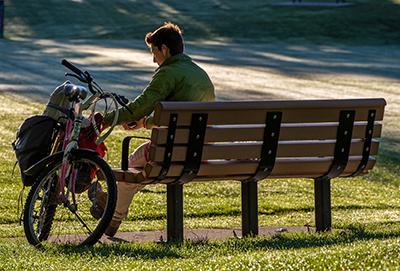What is compost?
Compost is the end product of decomposed organic matter, like food waste, yard waste and/or municipal wastewater. By composting, we can decrease the amount of material that ends up in our landfill and create a nutrient-rich resource to benefit our gardens, lawns, shrubbery, and flower beds. Composting has the added benefits of helping to reduce waste and combat climate change, helping with erosion control and moisture retention, and being an endlessly renewable resource.
How can I compost?
The City of Kamloops has three free yard waste drop-off sites that service both residential and commercial customers. Accepted items include:
- grass clippings
- leaves
- fallen fruit
- pumpkins
- garden waste **
- Christmas trees
- tree prunings up to 24" diameter
** Noxious weeds or invasive species should be bagged and placed in your garbage container or taken to the landfill for proper disposal.
Material from the all of the City's yard waste sites—approximately 11,000 tonnes each year—ends up at the Cinnamon Ridge Compost Facility and Yard Waste Site, where it is composted for 8-12 months via open-air windrow.
Cinnamon Ridge compost is available for purchase by the public. The fees are $25 per loaded tractor bucket (approx 500 kg) loaded by site operator, or $5 per small container (e.g. Rubbermaid tote) loaded by the customer. Please note that this material is a soil amendment that is intended to be mixed with soil prior to application.
Can I compost food scraps?
Following a one-year pilot program, in August 2023 the City implemented a community-wide curbside residential organic waste collection for all single- and multi-family households in the City of Kamloops. Learn more about residential organics.
Currently there is no community drop-off site for organics. In the future, after organics collection is established for curbside customers, the City hopes to investigate options for eventually implementing multi-family and commercial organics collection programs.
What about backyard composting?
Composting at home has many benefits such as:
- Reduces household solid waste (30-50%)
- Reduces odours from garbage
- Improves soil texture and fertility
- Improves water retention and drainage in soil
- Suppresses weeds
- Increases plant health
- It's environmentally friendly
The Thompson Nicola Regional District (TNRD) has several resources available for residents wishing to undertake composting at home. The City also runs workshops on how to compost through the Activity Guide.
If you choose to do your own composting, be sure to follow our Bear Smart tips.
How does the City use compost?
The City uses compost as top dressing on City fields, as an additive to soil around flower beds and shrubs, and as an enhancement to restoration material on project sites. The City's compost comes from both Cinnamon Ridge and the Ingerbelle Compost Facility in Princeton.



